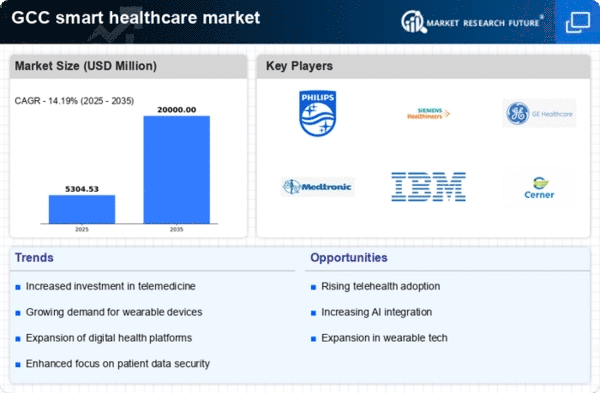Integration of Big Data Analytics
The integration of big data analytics into healthcare systems is a pivotal driver for the smart healthcare market. In the GCC, healthcare organizations are increasingly leveraging data to enhance patient care and operational efficiency. The market for big data in healthcare is projected to grow at a rate of 18% annually, reflecting the rising importance of data-driven decision-making. By analyzing vast amounts of health data, providers can identify trends, improve treatment protocols, and optimize resource allocation. This analytical approach not only enhances patient outcomes but also reduces costs associated with inefficient practices. As the smart healthcare market continues to evolve, the role of big data analytics will likely become more pronounced, enabling healthcare providers to deliver more personalized and effective care.
Government Initiatives and Support
Government initiatives play a crucial role in shaping the smart healthcare market. In the GCC, various governments are actively promoting digital health strategies to enhance healthcare services. For instance, the UAE's Vision 2021 aims to provide world-class healthcare through innovative technologies. Such initiatives often include funding for research and development, regulatory support for new technologies, and public-private partnerships. The GCC region is witnessing a surge in smart healthcare investments, with an estimated growth rate of 15% annually. This supportive environment encourages healthcare providers to adopt smart solutions, thereby driving market growth. As governments continue to prioritize health innovation, the smart healthcare market is expected to flourish, creating a more efficient and accessible healthcare system.
Increased Focus on Preventive Healthcare
The shift towards preventive healthcare is emerging as a significant driver for the smart healthcare market. In the GCC, there is a growing awareness of the importance of preventive measures to reduce healthcare costs and improve population health. This trend is reflected in the increasing adoption of health management apps and wearable devices that promote healthy lifestyles. The smart healthcare market is expected to benefit from this focus, as more individuals seek tools to monitor their health proactively. With an estimated 30% of healthcare expenditures attributed to preventable diseases, the emphasis on prevention is likely to drive investments in smart healthcare technologies. As healthcare systems adapt to this paradigm shift, the market is poised for substantial growth, fostering a culture of health and wellness.
Technological Advancements in Healthcare
The rapid evolution of technology is a primary driver for the smart healthcare market. Innovations such as artificial intelligence, machine learning, and the Internet of Things (IoT) are transforming healthcare delivery. In the GCC, investments in health tech are projected to reach $2.5 billion by 2025, indicating a robust growth trajectory. These advancements facilitate remote monitoring, personalized medicine, and improved patient outcomes. As healthcare providers increasingly adopt these technologies, the smart healthcare market is likely to expand significantly. Furthermore, the integration of advanced analytics into healthcare systems enhances decision-making processes, thereby improving operational efficiency. This trend suggests that the smart healthcare market will continue to thrive as technology becomes more embedded in healthcare practices.
Rising Demand for Remote Patient Monitoring
The increasing demand for remote patient monitoring is significantly influencing the smart healthcare market. As patients seek more convenient healthcare solutions, the adoption of telehealth services and wearable devices is on the rise. In the GCC, the market for remote monitoring technologies is anticipated to grow by 20% annually, driven by a growing population and a higher prevalence of chronic diseases. This trend indicates a shift towards proactive healthcare management, allowing patients to monitor their health from home. Consequently, healthcare providers are investing in smart healthcare solutions to meet this demand, enhancing patient engagement and satisfaction. The expansion of remote monitoring capabilities is likely to propel the smart healthcare market forward, as it aligns with the evolving expectations of patients and healthcare professionals alike.
















